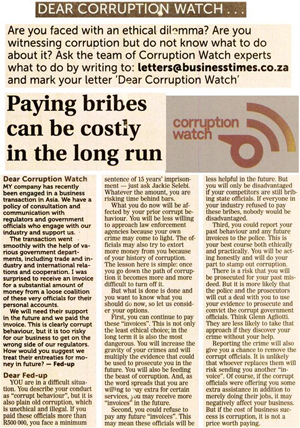|
Getting your Trinity Audio player ready...
|

Are you witnessing corruption but don’t know what to do about it? Ask the team of Corruption Watch experts what to do by writing to: letters@businesstimes.co.za and mark your letter ‘Dear Corruption Watch’.
Dear Corruption Watch
My company has recently been engaged in a business transaction in Asia. We have a policy of consultation and communication with regulators and government officials who engage with our industry and support us.
The transaction went smoothly with the help of various government departments, including trade and industry and international relations and cooperation. I was surprised to receive an invoice for a substantial amount of money from a loose coalition of these very officials for their personal accounts.
We will need their support in the future and we paid the invoice. This is clearly corrupt behaviour, but it is too risky for our business to get on the wrong side of our regulators. How would you suggest we treat their entreaties for money in future? – Fed-up
Dear Fed-up
You are in a difficult situation. You describe your conduct as "corrupt behaviour", but it is also plain old corruption, which is unethical and illegal. If you paid these officials more than R500 000, you face a minimum sentence of 15 years' imprisonment – just ask Jackie Selebi. Whatever the amount, you are risking time behind bars.
What you do now will be affected by your prior corrupt behaviour. You will be less willing to approach law enforcement agencies because your own crime may come to light. The officials may also try to extort more money from you because of your history of corruption. The lesson here is simple: once you go down the path of corruption it becomes more and more difficult to turn off it.
But what is done is done and you want to know what you should do now, so let us consider your options.
First, you can continue to pay these "invoices". This is not only the least ethical choice; in the long term it is also the most dangerous. You will increase the gravity of your crimes and will multiply the evidence that could be used to prosecute you in the future. You will also be feeding the beast of corruption. And, as the word spreads that you are willing to pay extra for certain services, you may receive more "invoices" in the future.
Second, you could refuse to pay any future "invoices". This may mean these officials will be less helpful in the future. But you will only be disadvantaged if your competitors are still bribing state officials. If everyone in your industry refused to pay these bribes, nobody would be disadvantaged.
Third, you could report your past behaviour and any future invoices to the police. This is your best course both ethically and practically. You will be acting honestly and will do your part to stamp out corruption.
There is a risk that you will be prosecuted for your past misdeed. But it is more likely that the police and the prosecutors will cut a deal with you to use your evidence to prosecute and convict the corrupt government officials. Think Glenn Agliotti. They are less likely to take that approach if they discover your crime without your help.
Reporting the crime will also give you a chance to remove the corrupt officials. It is unlikely that whoever replaces them will risk sending you another "invoice". Of course, if the corrupt officials were offering you some extra assistance in addition to merely doing their jobs, it may negatively affect your business. But if the cost of business success is corruption, it is not a price worth paying.
Take a stand and report an incident of corruption. This article originally appeared in the Sunday Times Business Times on 5 February 2012.




